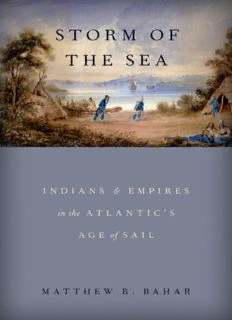
Storm of the Sea: Indians and Empires in the Atlantic’s Age of Sail PDF
Preview Storm of the Sea: Indians and Empires in the Atlantic’s Age of Sail
Storm of the Sea Storm of the Sea Indians and Empires in the Atlantic’s Age of Sail MATTHEW R. BAHAR 1 1 Oxford University Press is a department of the University of Oxford. It furthers the University’s objective of excellence in research, scholarship, and education by publishing worldwide. Oxford is a registered trade mark of Oxford University Press in the UK and certain other countries. Published in the United States of America by Oxford University Press 198 Madison Avenue, New York, NY 10016, United States of America. © Oxford University Press 2019 All rights reserved. No part of this publication may be reproduced, stored in a retrieval system, or transmitted, in any form or by any means, without the prior permission in writing of Oxford University Press, or as expressly permitted by law, by license, or under terms agreed with the appropriate reproduction rights organization. Inquiries concerning reproduction outside the scope of the above should be sent to the Rights Department, Oxford University Press, at the address above. You must not circulate this work in any other form and you must impose this same condition on any acquirer. Library of Congress Cataloging- in- Publication Data Names: Bahar, Matthew R. Title: Storm of the sea : Indians and empires in the Atlantic’s age of sail / Matthew R. Bahar. Description: New York, NY : Oxford University Press, [2019] | Includes bibliographical references and index. Identifiers: LCCN 2018022490 (print) | LCCN 2018025991 (ebook) | ISBN 9780190874254 (Updf) | ISBN 9780190874261 (Epub) | ISBN 9780190874247 (hardcover : alk. paper) Subjects: LCSH: Abenaki Indians—History. | Ocean and civilization. | Indians—First contact with Europeans. Classification: LCC E99.A13 (ebook) | LCC E99.A13 B245 2019 (print) | DDC 974.004/9734—dc23 LC record available at https://lccn.loc.gov/2018022490 1 3 5 7 9 8 6 4 2 Printed by Sheridan Books, Inc., United States of America For my parents CONTENTS Acknowledgments ix Introduction: Making, Forgetting, Remembering 1 1 The Indians’ Old Sea, to 1500 17 2 A New Dawn on an Old Sea, 1500– 1600 39 3 New Waves, New Prospects: Strategizing the Sea, 1600–1 677 67 4 Glorious Revolutions, 1678– 1699 99 5 Pieces of Eight, Pieces of Empire, 1700–1 713 131 6 The Golden Age of Piracy, 1714– 1727 159 7 Imperial Breakdown and the Crisis of Confederacy, 1727– 1763 187 Conclusion: What the Bell Tolls 213 Notes 221 Select Bibliography 263 Index 279 vii ACKNOWLEDGMENTS Since I began the journey here, many people have come and gone. Others have been there all along. Each shaped this book in their own way, and I happily ran up many debts because of it. The time and thought Josh Piker generously provided to this project, from start to finish, proved indispensable to its fruition. I can’t thank him enough for the myriad ways he helped sharpen the book’s prose and argument, and for modeling the very best of our profession. Cathy Kelly has also been there from the beginning, offering inestimable encouragement at every step. In formal and informal settings, I learned early on to value her insights on early America, aca- demic publishing, and life in the academy. Jamie Hart’s expertise in Tudor and Stuart England and steady support of my research interests enriched my explora- tion of early modern Atlantic history. Gary Anderson, Paul Gilje, Sterling Evans, and Karl Offen were also eager to share their time and thoughts. Fellow grad students at OU, especially Dave Beyreis, Patrick Bottiger, and Matt Pearce, pro- vided reliable sounding boards, entertaining diversions, and lasting friendships. Several other scholars have given generously to this project with their comments on various parts and iterations. I first presented my ideas to wider audiences at a fellows roundtable at the American Antiquarian Society, organ- ized by Paul Erickson, a brown- bag lunch talk at the Massachusetts Historical Society, organized by Conrad Wright, and at Jace Weaver’s “Exploring the Red Atlantic Conference” at the University of Georgia. At each, I was increasingly heartened to learn from participants that I was on to something. The week- long “Atlantic Geographies” workshop at the University of Miami, organized by Tim Watson, helped me interrogate the explanatory power of an Atlantic framework with junior scholars across the disciplines. Since these initial meetings, the proj- ect began to assume its present form thanks to the feedback of Colin Calloway, Kelly Chaves, Jeffers Lennox, Andrew Lipman, Daniel Mandell, Andy Parnaby, Jenny Hale Pulsipher, John G. Reid, Joshua Reid, and Daniel Richter. The ix
Description: